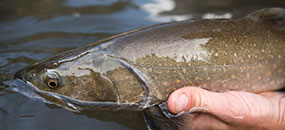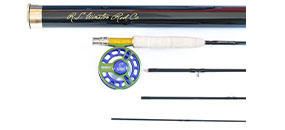November 2, 2005
Contact: Terry Turner, (360) 491-2024 (tnturner@comcast.net) or Mike Beagle, (541) 772-7720 (mbeagle@tu.org)
Gregoire’s efforts to protect Washington’s roadless areas are noble
TU encourages governor to participate in petition process as well
OLYMPIA, Wash.—Gov. Christine Gregoire’s efforts to protect Washington’s roadless areas through the Administrative Procedures Act are to be commended, according to national coldwater fisheries conservation organization Trout Unlimited, but to ensure preservation of the last, best places to hunt and fish in the state, she should also engage the U.S. Forest Service under the new roadless rule.
“The Forest Service has made it clear it likely won’t consider any requests under the APA,” said Terry Turner, TU spokesman in Washington state. “For that reason, the governor should also petition the government for roadless protection under the rule put in place in May. That’s our best hope when it comes preserving our state’s last, best places.”
Roadless areas are large, accessible backcountry areas of the U.S. Forest Service system that generally boast few roads, numerous hiking and horse trails and ample public access. Hunting and fishing is allowed in all roadless areas. Means of access, including motorized access in some cases, is determined by individual forests.
Washington has more than 2 million acres of inventoried roadless acres, all of which provide ideal habitat for deer, elk and other big-game species. Roadless areas are prime sources of fresh, clean water required by wild and native trout and salmon. The best spawning habitat for ocean-going fish is in rivers and streams flowing through or from roadless areas.
Allowing more development in Washington’s roadless areas would be devastating to the state’s sportsmen who depend on these areas to nurture the healthiest game herds and the most numerous anadromous fish runs. And, since the Forest Service faces a maintenance and capitol improvement backlog of nearly $200 million on existing roads through the Forest Service system in Washington alone, allowing more road-building in the state makes no fiscal sense, Turner said.
Ideally, he noted, the governor would lean on the state’s federal delegation for money to improve the existing road system, which provides ample access to Washington’s Forest Service lands. Improving the quality of existing roads and trails would go a long way toward maintaining access to the state’s roadless areas.
Turner also noted that many of the state’s roadless areas aren’t truly roadless. Some have roads and Jeep trails bisecting them, and others have off-road vehicle trails into the backcountry.
“We have a chance to prevent these important areas from becoming trashed,” Turner said. “It’s important for Washington’s sportsmen to keep things like they are, and the best way to do that is for our governor to use the petition process put in place by the government. In this instance, with access as it is now, the status quo is the best option. Using the petition process wouldn’t close any roads, and it would discourage new road-building. It just doesn’t make sense to build new roads when we can’t afford to maintain the ones we already have.”
“Keeping roadless areas in their present condition would guarantee our rights to hunt and fish on public lands forever,” said Mike Beagle, TU’s roadless coordinator in Washington. “Roadless areas are good for fish and wildlife, and they’re good for anglers and hunters. Keeping things like they are now would ensure that our children and grandchildren would have the same hunting and fishing opportunities we have today.”



